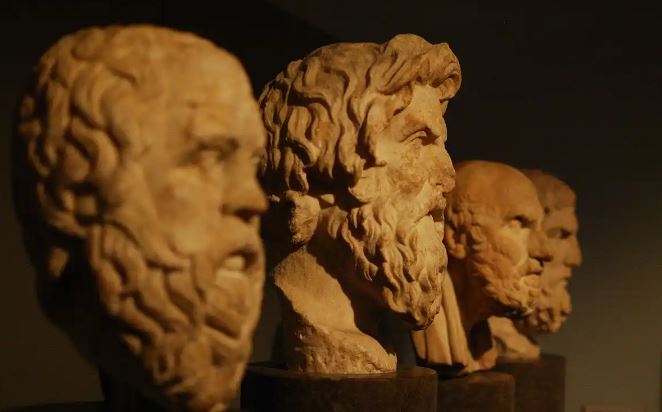Eudaemonism is an ethical-philosophical position that bases the moral actions of human beings on happiness. That is, the only way to be happy would be to act correctly.

Eudaemonism is a philosophical current that collects various ethical theories. This position maintains that happiness is a supreme good that everyone wants to achieve. To achieve this we must act correctly. In other words, we will be happy to the extent that we do good.
But what does it mean to act correctly? Below we will briefly expose this ethical approach, some of its aspects and in what situations in everyday life this philosophy is reflected.
What is eudaemonism?
Eudaemonism comes from the Greek term eudaimonia, which means “bliss, well-being or happiness.” For its part, the Royal Spanish Academy defines eudaemonism as an ethical theory that places happiness as the foundation of morality.
In this sense, eudaemonists assume that happiness is the ultimate goal that every human being wishes to achieve and that the only way to experience it is by acting morally well.
There are some ethical theories that have been considered as eudaemonism, since they base their moral standards on the realization of full happiness. Some of them are the following:
Ethical Hedonism: it states that every human being must pursue pleasure and reduce pain. Likewise, it establishes that obtaining pleasure must come from sources considered morally good. This can be achieved tangibly (through the senses) or spiritually.
Stoicism: proposes that the pursuit of happiness is not obtained in the material or in excessive pleasures. Instead, this would be in the rational control of desires, deeds or passions that can disturb the soul. Whoever manages to do so will have achieved virtue and full happiness.
Utilitarianism: affirms that the best action is the one that produces the greatest happiness and well-being to the greatest number of people.

The pursuit of happiness has led people to think of ways to achieve it. From there appear philosophical currents that investigate this point.
How did eudaemonism originate?
Eudaemonism is thought to have originated in Ancient Greece during the 6th century BC. In this period, deep and critical reflection on the moral principles of the time was common. From there, ethical positions emerged, including eudaemonism.
However, Aristotle (384 BC – 322 BC) is considered the father and the most important defender of eudaemonism. According to this thinker, if we do good we will be in a position to achieve happiness.
With the passage of time, many currents began to consider eudemonia as a supreme good. Among them Cyrenaism, Stoicism, Neoplatonism and Utilitarianism. Even in the Christian church eudaemonism had an influence with Saint Augustine and Saint Thomas Aquinas.
There are two types of eudaemonism
Depending on the extent of happiness, eudaemonism has been categorized as individual and social. Below we detail each one:
Individual eudaemonism: it can be said that it is the classical eudaemonism developed by Aristotle. In this case, the search for personal happiness is the ultimate goal. Therefore, man must act correctly to procure his own happiness and satisfaction from him.
Social eudemonism: affirms that happiness is not only of an individual, but also involves the collective. This type of eudaemonism is found in utilitarian philosophers. According to them, actions will be good or bad to the extent that they facilitate or hinder the happiness of all or the greatest number of people.
Main characteristics of eudaemonism
In order to provide a clearer idea about eudaemonism, we have summarized its main characteristics below:
It is an ethical position that affirms that happiness is the highest good that every human being yearns for.
Moral norms are based on full happiness (individual or collective).
Living and acting according to reason should be the highest trait sought by all people.
Getting carried away by passions (emotions, feelings, prejudices) does not usually lead to happiness.
Happiness is achieved through the proper use of reason.
Main representatives of eudaemonism
There are many eudaemonist thinkers that have emerged throughout history. However, we will name some of the most influential.
Aristotle
Aristotle is one of the pioneers of this theory and the most important eudemonist. According to this Greek philosopher, we will be just and virtuous to the extent that we know how to find a balance between two opposite passions.
For example, how will we act in a generous way? According to this philosopher, we will do so by finding a middle point between generosity and selfishness. That is, between a detached and altruistic attitude towards others and an interest in their own well-being.
We would find this balance through reason. In this way, if we have identified them, we will be able to achieve happiness.
Epicurus of Samos (341 BC – 270 BC)
This thinker affirmed that the human being must always seek happiness. The same would be achieved through prudence, sobriety and friendship. Like Aristotle, he affirmed that reason should be used to avoid excesses, since these can cause later suffering.
On his part, he assumed that the pleasures of the soul are superior to those of the body. Both must be satisfied with intelligence. The ideal is to reach a state of well-being that he called ataraxia.
He was not in favor of debauchery, but neither did he support renouncing carnal pleasures. Instead, he asserted that a middle ground must be sought and that bodily satisfactions must be realized as long as they do not cause subsequent pain.

Greek philosophy delved into this current from different approaches.
Jeremy Bentham (1748-1832)
He is known as the father of utilitarianism. He bases his ethical doctrine on the enjoyment of life instead of sacrifice or suffering. In this sense, the ultimate goal is to achieve the greatest happiness for the greatest number of people.
This thinker creates a happiness calculation, an algorithm that measures the degree of happiness that a certain action produces. Hence, moral rectitude. It is also known as utilitarian calculus or hedonistic calculus.
Eudaemonism in everyday actions
Today many people act under the precept of eudaemonism, almost certainly without knowing it. Some of the situations in which this ethical stance becomes evident are the following:
Large non-governmental organizations or NGOs that provide their services at no cost to contribute to the recovery of the environment.
Teachers and educators who dedicate their time to teaching without receiving any financial remuneration for it.
That person who dominates their emotions in situations that warrant it (related to stoicism).
So, perhaps, this philosophical current has marked your existence and you did not know it. Learn more about it and evaluate if it is something that you can apply in your life or not.





